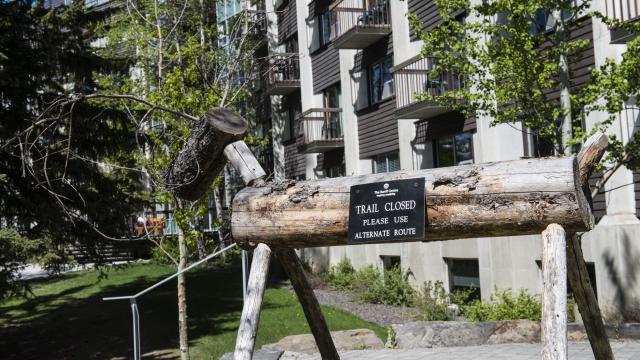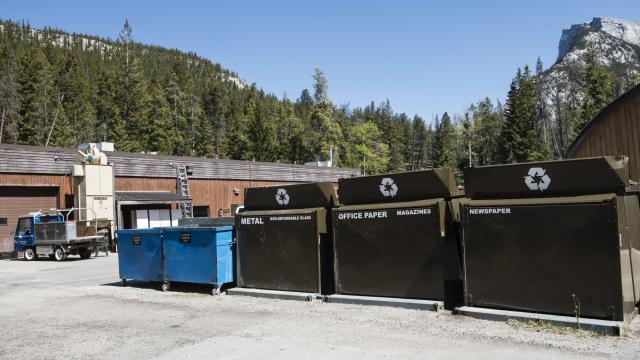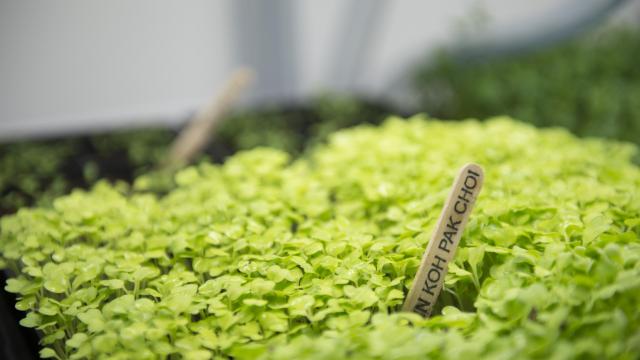Throughout Banff Centre, changes have been made and systems have been put in place to reduce the use of electricity, water, and fuel. The Centre continues to improve resources saving measures and processes whenever possible.
Reducing Electricity Use
- 95 per cent of campus has been retrofitted to high-efficiency lighting.
- As renovations are planned, LED lighting is being considered as an option.
- Over 100 motion/occupancy sensors have been installed in public and staff washrooms.
- Exterior exit lights and Christmas lights have been switched to energy saving LED lights.
- Most campus mechanical fan motors are fitted with VSD™ (Variable Speed Drives) which allow the motors to produce the desired results in a far more efficient manner than motors with a simple start/stop control system.
- Vehicle block heater plug-ins in the parkade are on a rotating 20 minute on/off cycle.
- All IT equipment is energy efficient, and upgrades continue to reduce the equipment energy use.
Water Conservation
- As part of the Centre’s Revitalization project, a Storm Water Management Plan has been created to identify and implement best management practices. As part of the first phase of Revitalization, a bioswale has been built to catch and retain storm water and filter pollutants. The plan includes reducing the amount of impermeable ground cover at the Centre.
- In order to reduce watering requirements the Centre is minimizing non-native plants.
- Over 225 ultra low flush toilets have been installed. A policy has been put in place to replace remaining old models with low flush models as they fail.
- Touch-less water saving washroom faucets, low flow showerheads, and sink aerators have been installed.
- Modifications have been made to processes in film and print making areas in order to reduce the use of water and hazardous chemicals.
- Two waterless urinals have been installed in Physical Facilities.
- New high efficiency front load washers are being used in guest and staff accommodation to reduce water and electricity consumption.
- The Centre’s Hospitality division encourages guests to re-use bed linens and towels in order to reduce the amount of linens being washed.
Saving Fuel / Green Energy
- Walking, pedaling, public transportation systems, and carpooling are encouraged for staff, guests, and participants.
- Physical Facilities has an electric truck, purchased in 2012 and fueled on green electricity.
- Our on-campus electric truck requires only distilled water and a good daily charge. Banff Centre has a permit to run the truck from the Alberta government, which stipulates that the truck is only to be used on Banff Centre campus. It is primarily used by the carpenters for transporting materials around campus and lives in the carpenter's shop where it is charged on a nightly basis. The electricity used to charge the truck is green power purchased from BullFrog Power.
- Electricity and travel are necessary to present the Banff Mountain Film and Book Festival and the Banff Mountain Film Festival World Tour. Mountain Culture tries to use only what they need and purchases Green Energy from Bow Valley Power to offset all carbon emissions from the festivals in Banff and from tour travel throughout Canada and the U.S.
Efficient Mechanical Systems
- Building-specific energy management plans have been implemented to conserve water, gas, and electricity.
- Separate utility meters have been installed in individual buildings at the Centre in order to effectively measure and manage utility usage.
- A Direct Digital Control system has been put in place in order to more efficiently manage and control temperature and air flow in all buildings on campus from one central location.
- When they require replacement, pumps and motors throughout campus are replaced with energy efficient units.
LEED Certification
Banff Centre's Kinnear Centre for Creativity and Innovation has received the prestigious LEED GOLD Certification, as well as the renovated Donald Cameron Centre. LEED is a standard established by the U.S. Green Building Council and endorsed by the Canada Green Building Council that encourages a careful analysis of buildings with respect to site selection, water and energy efficient design, selection of building materials, consideration of indoor environmental quality and maintenance of the building.



